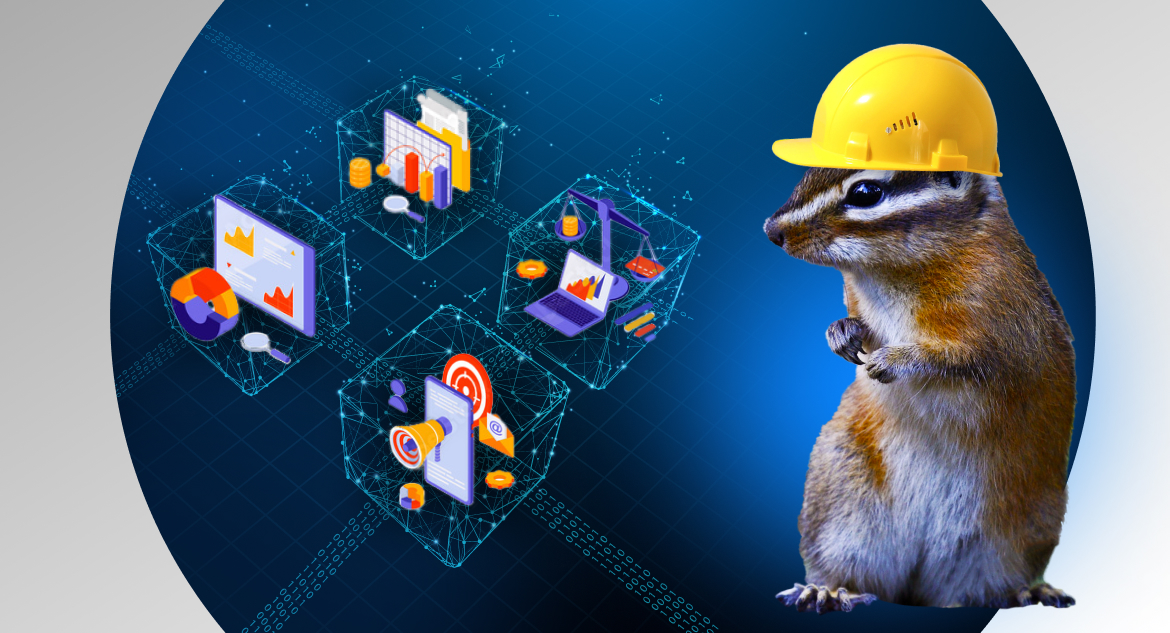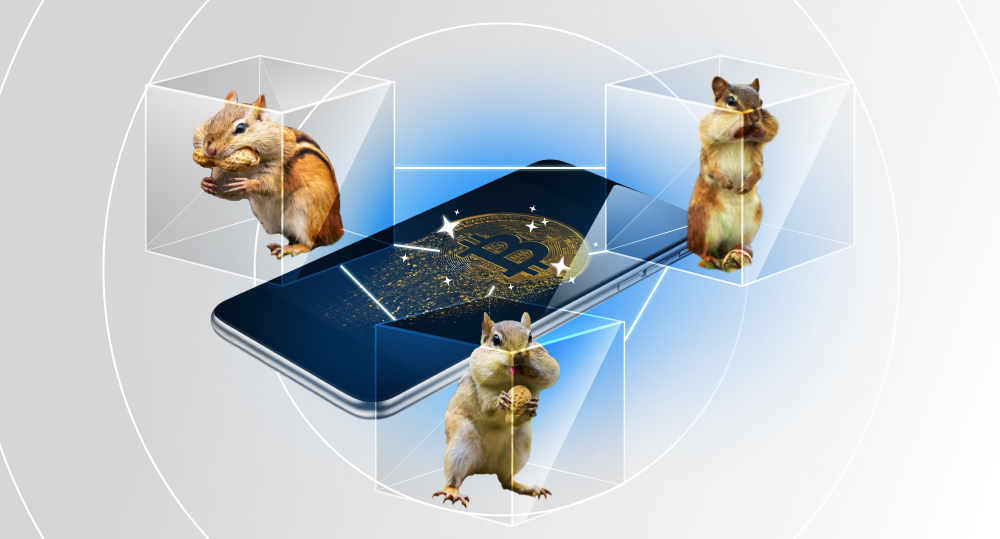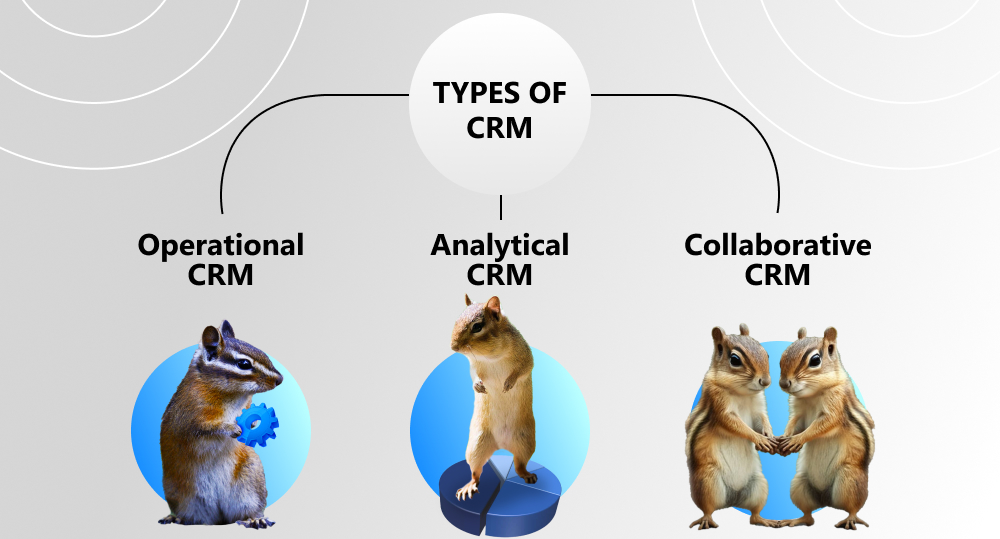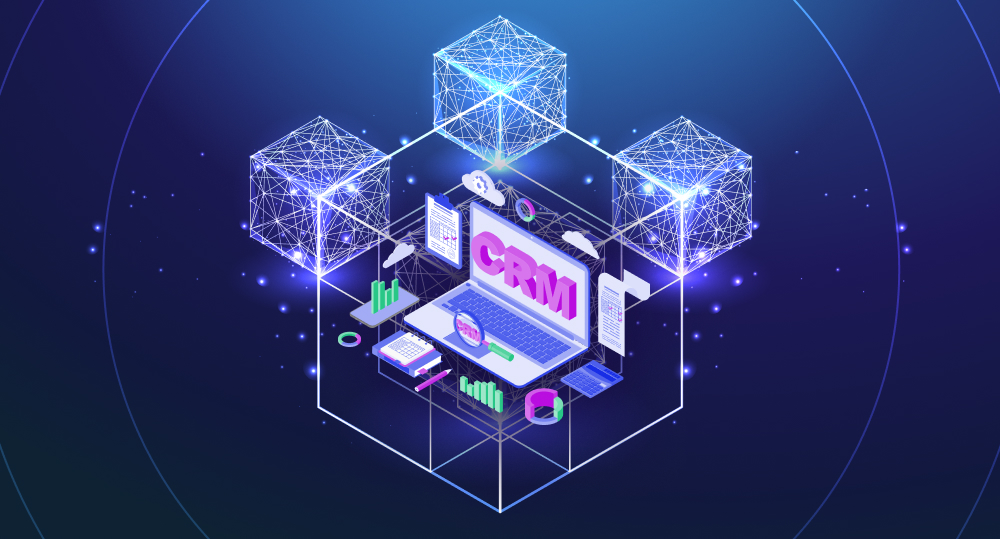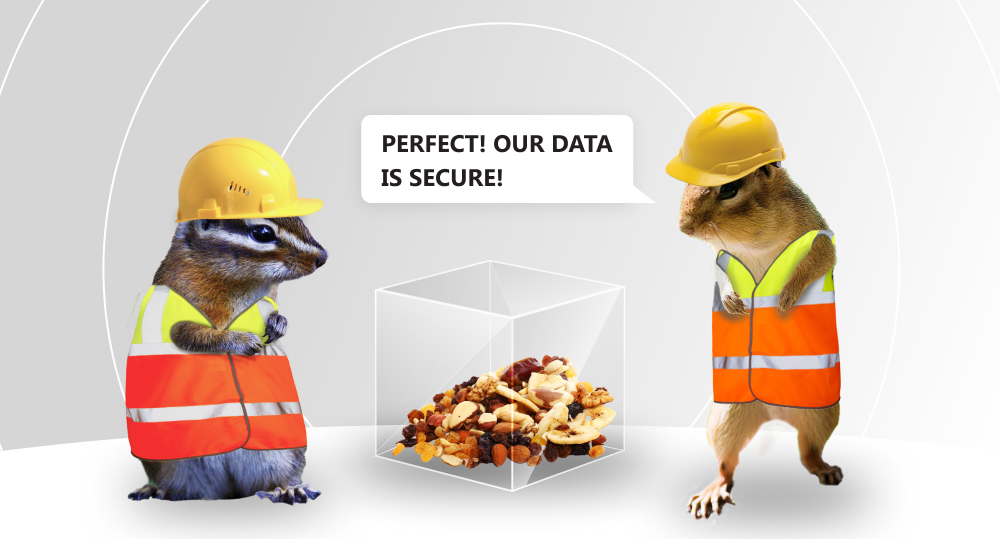Blockchain CRM is changing how companies approach their operations, and you need to get your business up to speed. You probably have a basic CRM system, but you’re not seeing the best results. So you're on the lookout for a better system in your workplace, because your current one isn’t it. We can assure that blockchain CRM is what you’ve been searching for!
Blockchain can significantly alter not only how we approach CRM, but also corporate operating methods. It has the ability to streamline processes, increase efficiency, and enhance security. Although in its early stages, it's never too early to stay ahead of the competition! No more words-let’s get to it!

written by:
Alexander Arabey
Director of Business Development
Contents
What Is Blockchain?
When you hear the word "blockchain", does your mind immediately go to the world of bitcoin? Although the two do go hand in hand, blockchain technology has a multitude of other uses. Blockchain is a way to make trades such as financial transactions, without a middleman. Instead of a single corporation with a single database that keeps all of the data, it is more like a collection of computers that all have the same transaction history.
At its core, blockchain is encrypted ledgers that function without centralized management and stores transactional data. So you might have a copy of the list on your computer, and then everyone validates it, and that becomes the next portion of the list. It is continually being updated, which is how it remains secure.
What Does CRM Stand For?
Now that we've had a refresher course on what blockchain is, let's go over what CRM software is. CRM stands for customer relationship management, so CRM software is the type used to enhance customer experience through tracking customer insights.
What Types of CRM Are Out There?
1. Analytical CRM Systems
The main purpose of analytical CRM software is to assist you in analyzing your customer data in order to acquire valuable insights. The consumer data that is collected in their complete customer profile can be categorized into three areas: sales data, financial data and marketing data.
Massive quantities of data are gathered using digital tools and platforms. Analytical CRM is a behind-the-scenes procedure; the customer is unaware that their activities and interactions with the organization are being recorded and analyzed.
2. Collaborative CRM Systems
Collaborative CRM enables communication between several enterprises involved in customer service. CRM collaboration might encompass different corporate departments such as marketing, advertising, customer support, technical assistance, clients, suppliers, and resellers. Collaborative CRM ensures that all teams, irrespective of department or channel, have access to the same constantly updating customer data.
Each encounter in collaborative CRM is seen as part of a bigger, unified dialogue between the company and the consumer. This unification of divisions and networks prevents clients from having to repeat themselves each time they speak with a new person. Something I'm sure we can all relate to when dealing with customer service!
No matter which employee they are dealing with, every person at that organization can easily obtain records about their previous dealings so that they can fully understand them as a consumer.
3. Operational CRM Systems
Operational Customer Relationship Management (CRM) plays a crucial role in streamlining a company's operational processes related to customer interactions. It provides functionalities to enhance the visualization and management of the entire customer journey, even when it involves a substantial number of interactions. The journey commences with the initial interaction on the company's website, progresses through the complete lead management process within the sales funnel, and concludes with understanding customer behaviors post their conversion into clients.
Operational CRM systems often incorporate automation components. Marketing, sales, and service automation functions alleviate the burden on staff by handling repetitive tasks, allowing them to redirect their efforts towards areas that require human intervention. This not only frees up valuable time for employees but also streamlines CRM processes, enabling growing businesses to consistently deliver exceptional service even as they expand.
How Can Blockchain Be Used in CRM?
By using this dynamic duo, CRM blockchains provide decentralized and encrypted ledgers that function as a trustworthy archive for financial transactions as well as other sensitive data like identification and public records. To help with the issue of the automatic implementation of contractual tasks during data transfer, smart contracts are used.
Benefits of Using Blockchain-Based CRM
CRM blockchain overall can be an incredibly efficient and personalized experience when looking at it from a consumer's perspective. Every corporation out there, no doubt, values their audience and only wishes to provide the best possible experience for them. But let's take a deeper look at how CRM blockchain benefits you on a company level.
Data Cleansing
Blockchain enables businesses to completely avoid the problem of erroneous, outdated, and duplicate data entries. As a result, they may gain deeper insights into their consumers and interact with them more successfully.
Enhancement of User Privacy Control
Because blockchain is a decentralized and encrypted structure, it allows for the concept of self-sovereign identification. It encrypts confidential data and authenticates without disclosing any details to the individuals involved. This gives people more control over their identities and the ultimate data privacy.
Enhanced Security
Blockchain is a chain of blocks that are cryptographically linked to each other, while CRM data is stored on cloud servers. Blockchains are decentralized and spread over peer-to-peer networks, making tampering difficult and removing the possibility of fraud and repudiation.
Increased Transparency
As mentioned before, blockchain has removed the need for the almighty “middleman”. This in turn enables your firm to engage with consumers safely and openly without the need for a financial institution, such as a bank or a third-party broker.
Does Salesforce Use Blockchain?
When talking about blockchain CRM, we can’t forget one of the absolute #1 CRM vendors out there on the market. This blockchain data platform is truly the epitome of all things revolutionary when it comes to incorporating blockchain in CRM processes. But let’s get one thing out of the way, Salesforce isn’t your ordinary CRM system, in fact, you could argue that it’s not a true CRM at all! A better way to put this into perspective is to pretend that their CRM is an app on a phone that works on top of their Salesforce platform. The parallel of this would be the messaging app on an iPhone that is running on top of their iOS platform.
So what is Salesforce after all? It is a cloud-based CRM system, run on a SaaS platform, that allows for unrivaled versatility to handle client data, sales operations, and marketing campaigns.
Salesforce introduced a blockchain platform in 2019 to encourage the creation of blockchain networks as well their overall collaboration with CRM.
Salesforce Blockchain is divided into three parts: Blockchain Builder, Blockchain Connect, and Blockchain Engage.
Blockchain Builder is a collection of tools for developing Salesforce Blockchain applications, enabling developers and executives to develop apps, add partners, and configure nodes.
Blockchain Connection is a modern networking service that enables blockchain items and fields to be viewed on ledgers in Community, Lighting, or bespoke programs.
Blockchain Engage enables the distribution of Salesforce Blockchain services and grants collaborators in a private system both read and write access permissions.
FAQ:
1. How can blockchain be used in CRM?
Blockchain for CRM is utilized by enhancing consumer relationships with the brand by delivering transparency, trust, security, and purchasing process simplicity, resulting in greater customer loyalty.
2. Does Salesforce use blockchain?
Salesforce began using blockchain in 2019 as a way to promote the development of blockchain networks and their general engagement with CRM.
3. What are the 3 types of CRM?
The three types of CRM are analytical, collaborative, and operational. What you choose will depend on your current software system, your needs, budget, who is going to use it, and how you want to interact with its users.
4. What does CRM stand for?
CRM stands for customer relationship management which is used to improve customer experience by tracking consumer distributed data.
Will You Be Using Blockchain Technology?
At the end of the day, blockchain CRM software is an amazing tool that is revolutionizing how companies use CRM databases. This is clearly a win-win solution for both consumers and companies regarding data safety and efficiency. As per a study done by Gartner, Inc., CRM software climbed 15.6% to $48.2 billion in 2018. Those numbers will only continue to grow with blockchain on the horizon, shaking things up.
We are sure that the benefits of this emerging technology are now clearer to you. How about implementing this revolutionary feature into your organization? Contact Qulix to learn about the newest technology blockchain solutions we can provide to bring your most audacious concepts to life.

Contacts
Feel free to get in touch with us! Use this contact form for an ASAP response.
Call us at +44 151 528 8015
E-mail us at request@qulix.com

